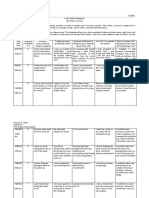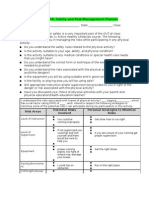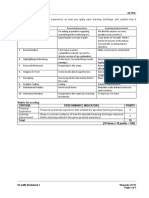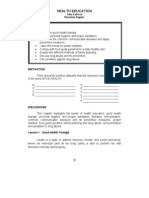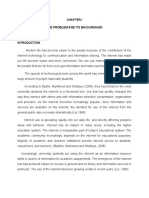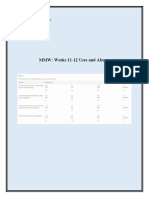05 Worksheet 16
05 Worksheet 16
Uploaded by
Flordaline DonayreCopyright:
Available Formats
05 Worksheet 16
05 Worksheet 16
Uploaded by
Flordaline DonayreOriginal Title
Copyright
Available Formats
Share this document
Did you find this document useful?
Is this content inappropriate?
Copyright:
Available Formats
05 Worksheet 16
05 Worksheet 16
Uploaded by
Flordaline DonayreCopyright:
Available Formats
GE2204
Name: Flordaline T. Donayre Date: Jan. 16, 2023
General Self-Efficacy Scale (GSE)
The General Self-Efficacy Scale is correlated to emotion, optimism, and work satisfaction. Negative
coefficients were found for depression, stress, health complaints, burnout, and anxiety.
Instructions
Below is a list of statements dealing with your general feelings about yourself. Please indicate how strongly
you agree or disagree with each statement.
Not at all Hardly Moderately Exactly
true true true true
1. I can always manage to solve difficult
□ □ □
problems if I try hard enough
2. If someone opposes me, I can find the
□ □ □
means and ways to get what I want.
3. I can easily stick to my aims and accomplish
□ □ □
my goals.
4. I am confident that I can deal efficiently
□ □ □
with unexpected events.
5. Thanks to my resourcefulness, I know how
□ □ □
to handle unforeseen situations.
6. I can solve most problems if I invest the
□ □ □
necessary effort.
7. I can remain calm when facing difficulties
□ □ □
because I can rely on my coping abilities.
8. When I am confronted with a problem, I
□ □ □
can usually find several solutions.
9. If I am in trouble, I can usually think of a
□ □ □
solution.
10. I can usually handle whatever comes my
□ □ □
way.
References:
Schwarzer, R., & Jerusalem, M. (1995). Generalized Self-Efficacy scale. In J. Weinman, S. Wright, & M.
Johnston, Measures in health psychology: A user’s portfolio. Causal and control beliefs (pp.
35-37). Windsor, UK: NFER-NELSON.
05 Worksheet 1 *Property of STI
Page 1 of 2
GE2204
Scoring:
Not at all true Hardly true Moderately true Exactly true
All questions 0 0 4 6
The total score is calculated by finding the sum of all items. For the GSE, the total score ranges between
10 and 40, with a higher score indicating more self-efficacy.
Interpretation and Summary:
The scale was created to assess a general sense of perceived self-efficacy with the aim of predicting coping
with daily hassles and adaptation after experiencing all kinds of stressful life events.
Self-efficacy is the belief that a person can finish a task or reach a goal. It is a person’s belief in their ability to
control their behavior, have an effect on their surroundings, and stay motivated to reach their goal. People can
have self-efficacy in school, work, relationships, and other important areas.
People may have a high sense of self-efficacy in areas where they believe they can excel, such as school,
work, friendships, parenting, sports, hobbies, and other activities.
Strong self-efficacy examples include:
A person struggling to manage a chronic illness believes that by working hard and following their
doctor’s recommendations, they can get back on track and improve their health.
A student who is confident in their ability to learn the material and perform well on a test.
Someone who has recently accepted a job in a role they have never performed before but believes
they have the ability to learn and perform well.
People with low self-efficacy perceive difficult tasks as threats to be avoided. As a result, they avoid setting
goals and have low levels of commitment to the ones they do set.
When they experience setbacks, they tend to give up quickly. They are more likely to experience feelings of
failure and depression because they lack confidence in their ability to achieve. Stressful situations can also be
difficult to deal with, and people who lack self-efficacy are less resilient and less likely to recover.
How to Improve Self-Efficacy
Fortunately, self-efficacy is a psychological skill that can be developed and improved. Begin by considering
how you can incorporate Bandura’s sources of self-efficacy into your own life. Acknowledging your success,
observing your mentors, receiving positive feedback, and practicing positive self-talk are all ways to boost
your self-efficacy.
References:
Cherry, K. (2022). Self Efficacy and Why Believing in Yourself Matters? https://www.verywellmind.com/what-is-self-
efficacy-2795954
05 Worksheet 1 *Property of STI
Page 2 of 2
You might also like
- Unit 3 Culminating Activity Leadership InfographicDocument2 pagesUnit 3 Culminating Activity Leadership InfographicDeborahNo ratings yet
- Learning Styles Based On Jung's TheoryDocument6 pagesLearning Styles Based On Jung's TheoryCatur Aditya RamadhanyNo ratings yet
- An Emerging Theory of Loyalty Program DynamicsDocument25 pagesAn Emerging Theory of Loyalty Program DynamicsSyawal FitriadyNo ratings yet
- Annotated BibliographyDocument9 pagesAnnotated Bibliographyapi-456896280No ratings yet
- Expressing Idea and Debating SkillsDocument4 pagesExpressing Idea and Debating SkillsAnggun SeptianiNo ratings yet
- 01 Self-Awareness Worksheet 1Document2 pages01 Self-Awareness Worksheet 1Ex LoverNo ratings yet
- 02 Performance Task 1 - ARG - LomibaonesliemarDocument2 pages02 Performance Task 1 - ARG - LomibaonesliemarlomibaoneslieNo ratings yet
- Film ReviewDocument2 pagesFilm ReviewCoco SantiagoNo ratings yet
- 1q Entrep Module Week 1 MidtermDocument29 pages1q Entrep Module Week 1 MidtermjerrilynagaraoNo ratings yet
- I Enjoy Communicating: With Persons Unlike Me As Much As With Persons Like MeDocument39 pagesI Enjoy Communicating: With Persons Unlike Me As Much As With Persons Like MeCamille Gene SolidumNo ratings yet
- NSTP Mental HealthDocument35 pagesNSTP Mental HealthRainiel GanarealNo ratings yet
- The Objectives and Functions of Operating Systems: Student - Feedback@sti - EduDocument5 pagesThe Objectives and Functions of Operating Systems: Student - Feedback@sti - Edunew genshinNo ratings yet
- Costing and Pricing - 02 - Activity - 1Document1 pageCosting and Pricing - 02 - Activity - 1JERMAINE APRIL LAGURASNo ratings yet
- Jeep Accel (Interview Question)Document1 pageJeep Accel (Interview Question)Dabon Jade Denver MacalitongNo ratings yet
- 04 Laboratory Exercise 1 5 AnswerDocument1 page04 Laboratory Exercise 1 5 AnswerIrold SanchezNo ratings yet
- 02 - Task - Performance - 1 (970) EuthenicsDocument4 pages02 - Task - Performance - 1 (970) EuthenicsAna Lyn AbadNo ratings yet
- Personality Development Module 2Document9 pagesPersonality Development Module 2Jhen-Jhen Geol-oh BaclasNo ratings yet
- TFN Report SummaryDocument3 pagesTFN Report SummaryA CNo ratings yet
- Polya's 4 Step in Problem SolvingDocument17 pagesPolya's 4 Step in Problem SolvingJohn Kenneth MimayNo ratings yet
- 06 PTintroDocument2 pages06 PTintroKamote Que100% (2)
- RM 5-PA: Safety and Risk-Management Planner: Risk Areas Potential Risks Involved Personal Strategies To Minimize RisksDocument4 pagesRM 5-PA: Safety and Risk-Management Planner: Risk Areas Potential Risks Involved Personal Strategies To Minimize Risksapi-19826231No ratings yet
- Stress & Depression Comparing and ContrastingDocument3 pagesStress & Depression Comparing and ContrastingCarlo Lopez CantadaNo ratings yet
- Understanding The Self: ActivityDocument4 pagesUnderstanding The Self: ActivityAdrienne Dave MojicaNo ratings yet
- Contemporary WorldDocument11 pagesContemporary WorldCriza Mae Castor PadernalNo ratings yet
- Create A Venn Diagram Comparing and Contrasting Western and Eastern Philosophy in Relation To Their View of The Good LifeDocument1 pageCreate A Venn Diagram Comparing and Contrasting Western and Eastern Philosophy in Relation To Their View of The Good LifeAntonio Meneses Valdez0% (1)
- Task Performance I. Polya's Strategy: Criteria Description PointsDocument2 pagesTask Performance I. Polya's Strategy: Criteria Description PointsSherry Ann HerreraNo ratings yet
- Leadership Challenges For The Youth of TodayDocument5 pagesLeadership Challenges For The Youth of TodayJheny PalamaraNo ratings yet
- Directions: Give A Personal Experience On How You Apply Each Learning Technique and Explain How ItDocument1 pageDirections: Give A Personal Experience On How You Apply Each Learning Technique and Explain How ItShekainah GloryNo ratings yet
- Understanding PINOYDocument22 pagesUnderstanding PINOYIrish ManlangitNo ratings yet
- Lesson 4 Health PDFDocument25 pagesLesson 4 Health PDFRomeo BalingaoNo ratings yet
- Soc Sci Chapter 3 ReportDocument15 pagesSoc Sci Chapter 3 ReportClarence PilladaNo ratings yet
- UTS01 Seatwork 1Document1 pageUTS01 Seatwork 1Avegail Aster MencianoNo ratings yet
- Trillo 03actvity1argDocument2 pagesTrillo 03actvity1argDorothy Rose TrilloNo ratings yet
- Perdev Module 6 2022Document11 pagesPerdev Module 6 2022Feunna Lyn Forro-LagosNo ratings yet
- Math 152 ConceptsDocument62 pagesMath 152 ConceptsECE CAPILINo ratings yet
- Prog 1 ModuleDocument161 pagesProg 1 ModuleDiether Jay DenampoNo ratings yet
- Reaction PaperDocument2 pagesReaction PaperEmmanuel EvangelistaNo ratings yet
- 05 Assignment 1 Sason IT Service ManagementDocument4 pages05 Assignment 1 Sason IT Service ManagementJc ConsadNo ratings yet
- 12 Thus, There Are 12 "Handshake": Carry Out The PlanDocument2 pages12 Thus, There Are 12 "Handshake": Carry Out The Plankring kringNo ratings yet
- Directions: Find The NTH Term and Term 20 of Each of The Following Sequences. (20 Items X 2 Points)Document1 pageDirections: Find The NTH Term and Term 20 of Each of The Following Sequences. (20 Items X 2 Points)ROSENDA BALINGAONo ratings yet
- The Problem and Its BackgroundDocument19 pagesThe Problem and Its BackgroundLovie FuentesNo ratings yet
- Module 4 - Moral AccountabilityDocument6 pagesModule 4 - Moral AccountabilityJulie Anne CesarNo ratings yet
- GEC8 EthicsDocument10 pagesGEC8 EthicsArthur AnthamNo ratings yet
- Digital 114219Document18 pagesDigital 114219cresline repollo cuyosNo ratings yet
- SOLIMAN - 03 - Worksheet - 1Document2 pagesSOLIMAN - 03 - Worksheet - 1Jerick SolimanNo ratings yet
- Uts (Black)Document28 pagesUts (Black)Dexter B. BaldisimoNo ratings yet
- GEC 103 (Scie Nce, Tech Nolog Y, and Socie Ty) : Prepared By: Ma. Salve A. Camarista-M.A.Bio - SciDocument12 pagesGEC 103 (Scie Nce, Tech Nolog Y, and Socie Ty) : Prepared By: Ma. Salve A. Camarista-M.A.Bio - SciJulienne CastilloNo ratings yet
- 01 Seatwork 1Document1 page01 Seatwork 1Nico Marquez100% (1)
- GAYETA, Robert Kyle P. MMW Weeks 11-12 Uses and AbusesDocument4 pagesGAYETA, Robert Kyle P. MMW Weeks 11-12 Uses and AbusesKyle GayetaNo ratings yet
- GE ELEC Living in The IT ERA FinalsDocument47 pagesGE ELEC Living in The IT ERA FinalsAguilar, Danica Kate P.No ratings yet
- UNIT 1 The Self in Different PerspectivesDocument21 pagesUNIT 1 The Self in Different PerspectivesPrincess Angie Gonzales0% (1)
- 3 NSTP Manual AY 2021 2022 Self Awareness and Values Development 1Document5 pages3 NSTP Manual AY 2021 2022 Self Awareness and Values Development 1asdfqwertyNo ratings yet
- Uts FinalsDocument33 pagesUts FinalsA.J. ChuaNo ratings yet
- Module 4 Data ManagementDocument43 pagesModule 4 Data Managementjason mr.perfect11No ratings yet
- Ken Ken Puzzle Math in A Modern WordDocument7 pagesKen Ken Puzzle Math in A Modern WordJian Jezhl Hechanova LorenzoNo ratings yet
- Chapter II - The Impact of Our ImageDocument32 pagesChapter II - The Impact of Our ImageRanzel CruzatNo ratings yet
- Peace Theme 6Document30 pagesPeace Theme 6Rx ChauNo ratings yet
- Introduction To Computing - Lec 1Document67 pagesIntroduction To Computing - Lec 1Haisam ZiaNo ratings yet
- Module 2 Old Media in The New World (Gesabel B. Sardilla)Document5 pagesModule 2 Old Media in The New World (Gesabel B. Sardilla)sabel sardilla100% (1)
- Good Morning!Document45 pagesGood Morning!Princess Diane M. RagusNo ratings yet
- 05 Worksheet 1Document2 pages05 Worksheet 1Janilla TrevelesNo ratings yet
- 04 Task Performance 1Document2 pages04 Task Performance 1Flordaline DonayreNo ratings yet
- GASCON Symposium Narrative Report OpeningDocument7 pagesGASCON Symposium Narrative Report OpeningFlordaline DonayreNo ratings yet
- 04 Worksheet 1 DONAYRE-BSTM-1101Document5 pages04 Worksheet 1 DONAYRE-BSTM-1101Flordaline Donayre100% (1)
- 05 Task Performance 1 - Donayre BSTM 1101Document2 pages05 Task Performance 1 - Donayre BSTM 1101Flordaline DonayreNo ratings yet
- 05 Elms Task Comprehensive Historical Research Donayre BSTM 1101Document5 pages05 Elms Task Comprehensive Historical Research Donayre BSTM 1101Flordaline DonayreNo ratings yet
- Trait Emotional Intelligence and Leadership Self-EDocument10 pagesTrait Emotional Intelligence and Leadership Self-EAbdullah AdzkaNo ratings yet
- Muhammad Younas, Grameen Bank and The Nobel Peace Prize PDFDocument23 pagesMuhammad Younas, Grameen Bank and The Nobel Peace Prize PDFatta100% (1)
- Gec 101 ReviewerDocument5 pagesGec 101 ReviewerAlyssa TalaveraNo ratings yet
- Report 8 UtsDocument3 pagesReport 8 UtsMcblng JeehanNo ratings yet
- PR 2Document4 pagesPR 2verliegandelNo ratings yet
- Wardetal 2021Document13 pagesWardetal 2021Katherina AdisaputroNo ratings yet
- Language Teacher Agency: Jian Tao and Xuesong (Andy) GaoDocument72 pagesLanguage Teacher Agency: Jian Tao and Xuesong (Andy) Gaohamed100% (12)
- Moderating Effect of Product Type On OnlineDocument27 pagesModerating Effect of Product Type On OnlineshivacrazzeNo ratings yet
- 3 Gonzales - Palawan-Scientist 2018 PDFDocument19 pages3 Gonzales - Palawan-Scientist 2018 PDFNick CaigaNo ratings yet
- Measurement and Correlates of Family Caregiver Self-Efficacy For Managing DementiaDocument9 pagesMeasurement and Correlates of Family Caregiver Self-Efficacy For Managing DementiariskhawatiNo ratings yet
- ADocument15 pagesARobby Tubill FardhyNo ratings yet
- 2096 6089 1 PBDocument19 pages2096 6089 1 PBEdith Cynthya Villagra ApazaNo ratings yet
- Leon National High SchoolDocument32 pagesLeon National High SchoolFrancine Melea Cabanero DezaNo ratings yet
- Nola J. Pender's Health Promotion ModelDocument34 pagesNola J. Pender's Health Promotion Modeljay5ar5jamorabon5torNo ratings yet
- Career Guidance11 M7Document14 pagesCareer Guidance11 M7Eryx JoseNo ratings yet
- Do Not Just Dream, Make It HappenDocument12 pagesDo Not Just Dream, Make It HappenMary The SpidergalNo ratings yet
- Trans Accio NalDocument260 pagesTrans Accio NalErick Maldonado HerreraNo ratings yet
- Cormier Nurius Osborn 2009 Self Management StrategiesDocument45 pagesCormier Nurius Osborn 2009 Self Management StrategiesTheMixedPTNo ratings yet
- Ujian Tengan Semester Metodologi PenelitianDocument83 pagesUjian Tengan Semester Metodologi PenelitiankurniaselalupintarbaNo ratings yet
- Assessment FruuuuDocument29 pagesAssessment FruuuuNormina Cagunan0% (2)
- Contemporary Educational Psychology: Tim Urdan, Avi KaplanDocument10 pagesContemporary Educational Psychology: Tim Urdan, Avi KaplanGeorgiana CosminaNo ratings yet
- Teachers' Approaches Toward Cultural DiversityDocument2 pagesTeachers' Approaches Toward Cultural DiversityIonNo ratings yet
- The Effect of Early Childhood Abuse On Educational AttainmentaefeafDocument120 pagesThe Effect of Early Childhood Abuse On Educational AttainmentaefeafMegumiAlbaNo ratings yet
- Martin Ruble Szkrybalo Gender DevelopmentDocument31 pagesMartin Ruble Szkrybalo Gender Developmentmeylingalvarado100% (1)
- Facilitating Learner Centered Teaching Module 19 26Document72 pagesFacilitating Learner Centered Teaching Module 19 26Katherine Anne Munar-GuralNo ratings yet
- Cognitive Engagement StyleDocument19 pagesCognitive Engagement StylesnsclarkNo ratings yet
- The First Hebrew' Teachers in Eretz Yisrael: Characteristics, Difficulties and Coping Methods (1881-1914)Document21 pagesThe First Hebrew' Teachers in Eretz Yisrael: Characteristics, Difficulties and Coping Methods (1881-1914)Jennifer Leigh MoulthropNo ratings yet
- Behaviour Change To Address Climate Change 2021 Current Opinion in PsychologDocument6 pagesBehaviour Change To Address Climate Change 2021 Current Opinion in PsychologMeghaNo ratings yet
- Factors Affecting Accounting Students in Choosing Accounting Career PathDocument14 pagesFactors Affecting Accounting Students in Choosing Accounting Career PathGONZALES CamilleNo ratings yet















